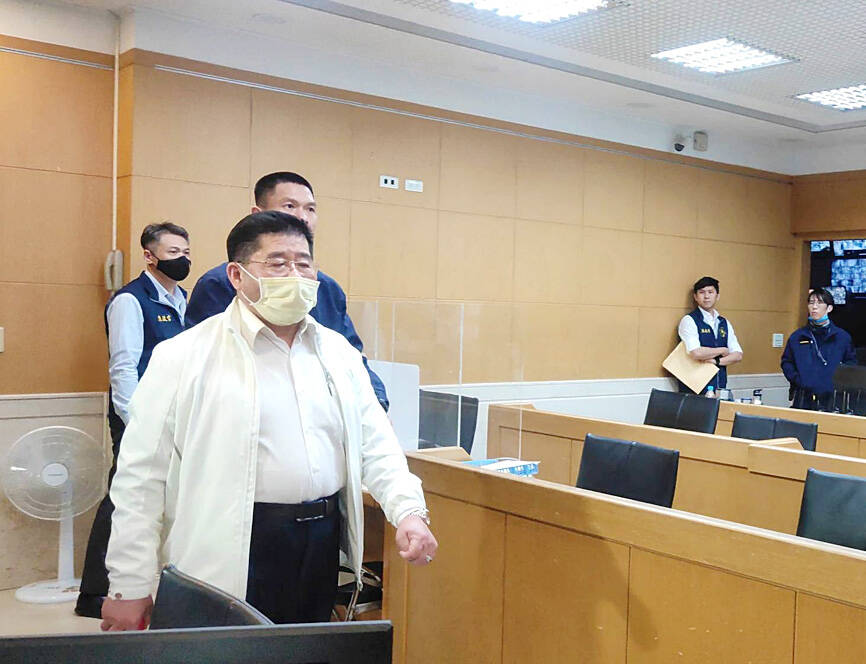Authorities yesterday questioned the owner, his son and executives of a telecommunications services company at the center of a corruption scandal in Taipei over alleged insider trading.
The Taipei District Prosecutors’ Office questioned Tai Tung Communication Co (台通光電) employees and executives — including its owner, Lee Ching-huang (李慶煌), and his son, Lee Chia-hao (李嘉豪), who was placed in pretrial detention with restricted communication.
The New Taipei City-based firm is the parent company of Taiwan Intelligent Fiber Optic Network Consortium (Taifo, 台灣智慧光網), which investigators last month accused of providing kickbacks to Taipei City Councilor Chen Chung-wen (陳重文) of the Chinese Nationalist Party (KMT) related to a city government project to install police surveillance systems and provide networking and data transmission services.

Photo: CNA
Yesterday, Agency Against Corruption units and Taipei prosecutors searched nine Tai Tung offices and employee residences, while serving summonses to executives related to alleged insider trading that led to profits of about NT$100 million (US$3.07 million), prosecutors said.
The agency and prosecutors alleged that Tai Tung, a publicly listed company on the Taiwan Stock Exchange, had announced a stock buyback on March 8, but that Lee Ching-huang, members of his family and some employees had prior knowledge of the deal, enabing them to purchase stock ahead of time.
A bail court hearing approved the pretrial detention of Lee Chia-hao, who holds the title of special assistant to the owner.
Prosecutors listed him as facing possible charges for contravening the Securities and Exchange Act (證券交易法) and requested that he be detained due to the possibility of collusion and tampering with evidence, a bail court hearing filing said.
Lee Ching-huang’s wife, Hsieh Yen-chun (謝燕春), was released on NT$3 million bail, while his ex-wives, surnamed Huang (黃) and Lee (李), were released on bail of NT$3.5 million and NT$2 million respectively. A company executive surnamed Shih (石) was released on NT$500,000 bail, while Lee Ching-huang was released without posting bail.
The Agency Against Corruption said that the investigation into insider trading stemmed from an earlier probe into reported corruption and kickbacks at Taifo, which had secured a NT$550 million contract with the Taipei City Government to supply police surveillance systems and networking and data transmission services.
An investigation found evidence that Chen had questioned officials and allegedly pressured the government to approve a higher budget for the contract with Taifo, whose chairman is Lee Ching-huang.
Investigators said that several million dollars in alleged kickbacks had flowed to accounts controlled by Chen.
The agency and prosecutors on March 14 initiated searches related to that investigation, detaining and questioning Chen and Lee Ching-huang in the process, along with other suspects.
Chen was detained as telephone records indicated he had called witnesses in an attempt to collude with them, while Lee Chiang-huang was released on a NT$3.5 million bill, prosecutors said.
The alleged insider trading activity was found while examining money flows and bank transactions in that case, prosecutors said.
Additional reporting by CNA

Chinese Nationalist Party (KMT) Chairman Eric Chu (朱立倫), spokeswoman Yang Chih-yu (楊智伃) and Legislator Hsieh Lung-chieh (謝龍介) would be summoned by police for questioning for leading an illegal assembly on Thursday evening last week, Minister of the Interior Liu Shyh-fang (劉世芳) said today. The three KMT officials led an assembly outside the Taipei City Prosecutors’ Office, a restricted area where public assembly is not allowed, protesting the questioning of several KMT staff and searches of KMT headquarters and offices in a recall petition forgery case. Chu, Yang and Hsieh are all suspected of contravening the Assembly and Parade Act (集會遊行法) by holding

PRAISE: Japanese visitor Takashi Kubota said the Taiwanese temple architecture images showcased in the AI Art Gallery were the most impressive displays he saw Taiwan does not have an official pavilion at the World Expo in Osaka, Japan, because of its diplomatic predicament, but the government-backed Tech World pavilion is drawing interest with its unique recreations of works by Taiwanese artists. The pavilion features an artificial intelligence (AI)-based art gallery showcasing works of famous Taiwanese artists from the Japanese colonial period using innovative technologies. Among its main simulated displays are Eastern gouache paintings by Chen Chin (陳進), Lin Yu-shan (林玉山) and Kuo Hsueh-hu (郭雪湖), who were the three young Taiwanese painters selected for the East Asian Painting exhibition in 1927. Gouache is a water-based

Taiwan would welcome the return of Honduras as a diplomatic ally if its next president decides to make such a move, Minister of Foreign Affairs Lin Chia-lung (林佳龍) said yesterday. “Of course, we would welcome Honduras if they want to restore diplomatic ties with Taiwan after their elections,” Lin said at a meeting of the legislature’s Foreign Affairs and National Defense Committee, when asked to comment on statements made by two of the three Honduran presidential candidates during the presidential campaign in the Central American country. Taiwan is paying close attention to the region as a whole in the wake of a

OFF-TARGET: More than 30,000 participants were expected to take part in the Games next month, but only 6,550 foreign and 19,400 Taiwanese athletes have registered Taipei city councilors yesterday blasted the organizers of next month’s World Masters Games over sudden timetable and venue changes, which they said have caused thousands of participants to back out of the international sporting event, among other organizational issues. They also cited visa delays and political interference by China as reasons many foreign athletes are requesting refunds for the event, to be held from May 17 to 30. Jointly organized by the Taipei and New Taipei City governments, the games have been rocked by numerous controversies since preparations began in 2020. Taipei City Councilor Lin Yen-feng (林延鳳) said yesterday that new measures by